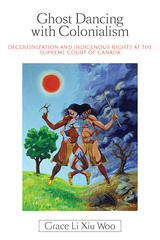
Following World War II, liberal nation-states sought to address injustices of the past. In keeping with trends in other countries, Canada’s government began to consider its own implication in various past wrongs, and in the late twentieth century it began to implement reparative justice initiatives for historically marginalized people. In 1996 the Canadian Criminal Code was amended with section 718.2(e), which instructs judges to consider reparative justice for Aboriginal offenders where possible. In 2012 a Supreme Court decision noted that no Aboriginal person should be sentenced without full consideration of the legacies of colonialism, displacement, and residential schools. Yet despite these efforts, there are more Indigenous and racialized people in Canadian prisons now than at any other time in history. In To Right Historical Wrongs, Carmela Murdocca brings together the paradigm of reparative justice and the study of incarceration in an examination of this disconnect between political motivations for amending historical injustices and the vastly disproportionate reality of the penal system – a troubling reality that is often ignored. Drawing on detailed examination of legal cases, parliamentary debates, government reports, media commentary, and community sources, Murdocca presents a new perspective on discussions of culture-based sentencing in an age of both mass incarceration and historical amendment.
Students and scholars in socio-legal studies and sociology, and those interested in race, gender, reparations, and historical injustice.
How can it be a bad thing to require judges to take notice of historical wrongs and to make a connection between past injustice and the present-day realities of the massive overincarceration of Indigenous peoples and other racialized groups? This book bravely answers this question. Carmela Murdocca compellingly argues that through apparently progressive sentencing provisions, Canadian courts have considered dispossessed and disadvantaged groups to be culturally different rather than historically wronged. The law carves out identities, she shows, assigning dominant groups the role of saviours of culturally different and dysfunctional groups. We cannot become responsible for historical injustice and confront its ongoing effects if we see our history as one that has colonialism but no colonizers. This book is an urgent plea, based on rigorous scholarship, that we go deeper than cultural difference in order to find ourselves as the beneficiaries of ongoing colonialism and racism, systems that continue to marginalize the dispossessed at ever-increasing rates.
An exciting contribution to the literature on restorative justice, culture, race, and gender.
Introduction
1 Culture and Reparative Justice
2 From Incarceration to Restoration
3 Her Aboriginal Connections
4 Racial Injustice and Righting Historical Wrongs
Conclusion
Notes; Bibliography; Index










